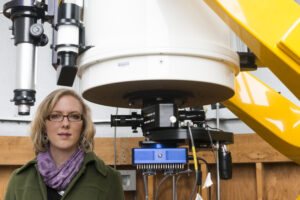
Photo credit: Deror avi, CC BY-SA 4.0 <https://creativecommons.org/licenses/by-sa/4.0>, via Wikimedia Commons
by Debbie Burke
Accountability.
Without an editor’s deadline hanging over us, our imaginations can come up with a thousand other things to do…except write.
Enlisting support from other writers works wonders. For years, critique groups kept me accountable and producing words because I had to turn in pages every week or month…
…or kick myself if I didn’t.
Another way to be accountable is by group writing. Several people designate an evening a month where they gather in a classroom or coffeeshop and write together for an hour or two. Because I’m used to writing alone without distractions like coughs and chairs scraping the floor, that practice always sounded a little difficult.
But my mantra is if it works, do it! Although I haven’t tried group writing, I’m always open to new tricks to be more productive.

Dr. Sarah Rugheimer – photo credit: Ben Gebo
Several months ago, my good friend Sarah Rugheimer (whom I’ve talked about on TKZ) proposed we do a weekly zoom meeting to write together. She’s in Toronto and I’m in Montana so we don’t get to see each other often. Zooming is the next best thing.
The format she proposed was to meet for an hour. For the first five to 10 minutes, we catch up, discuss what we’re working on, and state a goal for that session. Then we turn off the audio but leave the video on. She sets a timer for 50 minutes and we write. The last five minutes we report what we accomplished then say goodbye until next week.
Having a regular appointment means you have to show up. If you don’t, you let the other person down. We don’t want to disappoint our friends or colleagues. That’s accountability.
I mentioned we turn off audio but leave the video on. The first meeting, it felt kind of odd. It wasn’t meant to be a security camera watching to make sure we were writing. But it changed my normal concentration. When Sarah moved her laptop to a different spot or got up to make a cup of tea, I was aware of what she did.
Then I noticed her frowns and expressions of puzzlement. That was interesting because I suspect I make similar faces when I’m struggling to find the right word or frustrated if a sentence isn’t working.
I empathized because I was going through the same thing. In a weird way, 2000 miles apart, we were sharing our solitary experience.
I’m glad to report Sarah’s system works. We’ve been zooming weekly for few months. There’s a sense of satisfaction in telling a fellow writer when you accomplish a set goal. Family and non-writing friends smile and nod politely but only another writer truly gets it.
“Hey, I edited Chapter 14.”
“Great!” she says. “I finished the grant application that’s due tomorrow.”
“Cool! That’s a load off your mind.”
At our last session, I told Sarah I planned to write a post for TKZ about our zoom meetings. She grinned then told me about how she’d used zoom accountability with another friend, Dr. Sarah Ballard. Both were working on a self-care podcast. Sarah B. talked about using the zoom sessions for “SBT,” which Sarah R. initially thought referred to “Sarah Ballard Time.”
Turns out SBT means “Shame Based Tasks.”
You know, those projects you dread, the ones that cause you the greatest anxiety, and make you feel guilty for not doing them. The ones you worry over at 2 a.m. when you can’t sleep.
Because SBTs make us uncomfortable, we tend to put them off…and off…and off…
But zoom accountability sessions are the perfect time to complete SBTs.
At the beginning of the meeting, you state the goal out loud to your partner: “Today I’m going to email that agent who’s had my manuscript for nine months.”
Now you’re committed.
Your friend encourages you and may offer ways to tackle the problem you hadn’t thought of.
They reassure you and give you confidence that you actually can do it.
Your self-doubt lessens.
You dig in.
In the next 50 minutes, by golly, you actually do it.
You report to your partner who congratulates you.
You gleefully cross that shame-based task off your list.
Whew!
But what if you don’t have a friend to zoom with?
You can join an online group like the London Writers Salon that sponsors Monday through Friday writers’ hours. They offer hour-long zoom meetings at various times of the day for different time zones around the planet.
Two women started the program during the pandemic when they couldn’t have in-person meetings. The format was so successful that it continued and grew. Currently the program helps more than 800 writers be accountable and productive.
Zoom accountability works in ways I didn’t expect, especially with SBTs.
Plus, it’s always a pleasure to “see” my friend.
Thanks for suggesting this trick, Sarah!
~~~
TKZers: Have you ever tried zoom accountability with another writer? How do you keep yourself accountable and producing words? Please share your tips.
~~~
TKZ goes on our annual two-week break soon. Warm holiday wishes to TKZ friends and see you on the other side.
~~~
Debbie Burke holds villains accountable in Fruit of the Poisonous Tree.
Please check out the latest thriller at this link.


